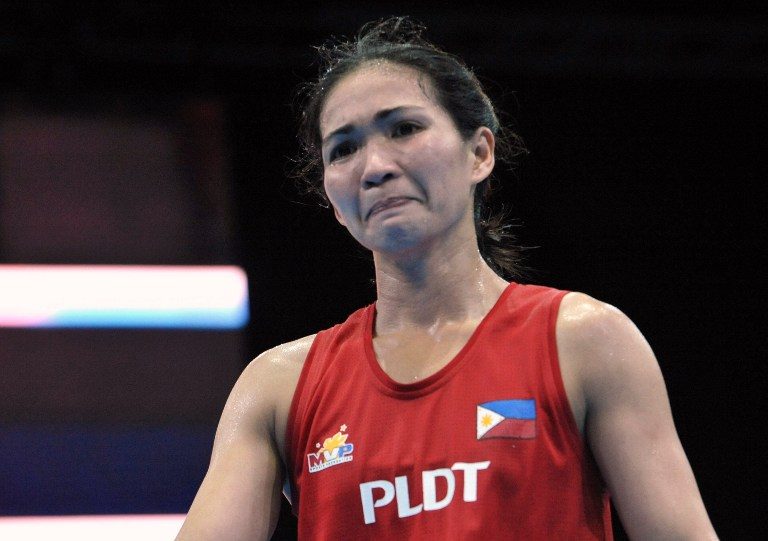SUMMARY
This is AI generated summarization, which may have errors. For context, always refer to the full article.

MANILA, Philippines – Since 2009, few things have been more reliable than Josie Gabuco winning gold at the Southeast Asian Games.
Since joining the biennial meet, The Puerto Princesa native has been without peer in the region, winning two golds at pinweight (up to 46 kilograms) in her first two trips to the SEA Games before winning golds at light flyweight (up to 49 kilograms) in 2013 and 2015.
The argument could be made that she’s the Philippines’ most accomplished amateur boxer since Onyok Velasco, having become the first Filipino boxer to win gold at the AIBA World Championships in 2012, when she beat the Chinese fighter in China to win the light flyweight championship.
Despite that unprecedented success, the SEA Games hold a special place in her heart. She lists her most recent gold finish in Singapore among her highest achievements, as it marked a career resurgence following a lackluster 2014.
“I really asked for that from God,” says Gabuco, who is training with the national team in Baguio City. “I was doubting myself. Good thing that there were still some people who continued to believe in me, so when I got the gold there I really cried.”
This year will be different because Gabuco won’t get to defend her title in Malaysia. That’s because the Malaysia organizers have decided to exclude women’s boxing at this year’s Games, slated for August 19-30 in Kuala Lumpur, despite it being an Olympic sport.
Also among the sports being axed is women’s weightlifting, meaning gold medal favorites from the Philippines like Hidilyn Diaz will not get to help improve the country’s sixth place finish in 2015.
“There’s not much we can do because as the way the SEA Games are set up, the host country normally has their way,” says Association of Boxing Alliances in the Philippines (ABAP) executive director Ed Picson, who also laments the exclusion of lightweight and welterweight in the men’s category. “They don’t have women boxers in Malaysia.”
Gabuco, who turns 30 this month, admits feeling “disappointed” about not being able to defend her title, and potentially derailing one of her goals in the sport.
“The SEA Games is very important to me because it is one of the major competitions that we join. I have a target that before I leave boxing, I would want to have a record in the SEA Games,” Gabuco says.
Goal-driven puncher
Gabuco is used to finding a way when one isn’t apparent. She picked up the sport in 2003 for a very practical reason, and made it to the national team after winning gold at the 2004 National Open in her hometown.
“The scholarship is really the first reason why I got into boxing,” said Gabuco, who was told by her uncle that the sport could help her attend college. “But when I was into the sport already, I slowly learned to like it.”
Gabuco did attend college, studying criminology at STI College in Manila. She also had a son, now aged 10, and she enlisted in the Navy. Running parallel to her success was the increasing acceptance of women’s boxing in the world, with women’s boxing becoming an Olympic sport in the 2012 Games. Gabuco’s accomplishments began to rack up and made her a role model to other young boxing aspirants.
“We have a boxer from Sultan Kudarat who idolizes Josie Gabuco,” says women’s team trainer and 1992 Olympic bronze medalist Roel Velasco, referencing national team boxer Carolyn Calungsod.
Without the SEA Games, Gabuco’s biggest tournament this year could be the ASBC Asian Confederation Women’s Boxing Championships, which take place October 10-19 in Ho Chi Min City, Vietnam. She has another, more lofty goal that she’s targeting for down the road: she wants to compete in the 2020 Olympics in Tokyo.
It’ll be difficult, as there are only 3 weight classes in women’s Olympic boxing (flyweight, lightweight and middleweight), and most of the talent in Philippine women’s boxing is centered around the flyweight division (up to 52 kilograms).
She’d have to beat out other top fighters in the national pool, like Irish Magno and Nesthy Petecio, who fell short of qualifying for the 2016 Games.
“You have to consider the age factor,” says Picson. “I hope she can keep herself fit and in shape for the next 3 years or so. Because talent wise, she’s one of the most talented boxers that we have and she’s one of our smartest boxers. She doesn’t punch hard but she knows when to attack and when to play it safe.”
Gabuco intends to serve out her military duties and pass on her expertise when she retires. But until then, she’s got her heart set on Tokyo 2020.
“As long as my body can still handle it,” Gabuco said, when asked how long she’ll fight for. “If I get the chance and my body can still take it, I want to participate in the next Olympics.” – Rappler.com
Editor’s note:An earlier version of this story stated that the SEA Games take place in April. This has been corrected to state that they take place in August.
Ryan Songalia is the sports editor of Rappler, a member of the Boxing Writers Association of America (BWAA) and a contributor to The Ring magazine. He can be reached at ryan.songalia@rappler.com. Follow him on Twitter @RyanSongalia.
Add a comment
How does this make you feel?
There are no comments yet. Add your comment to start the conversation.